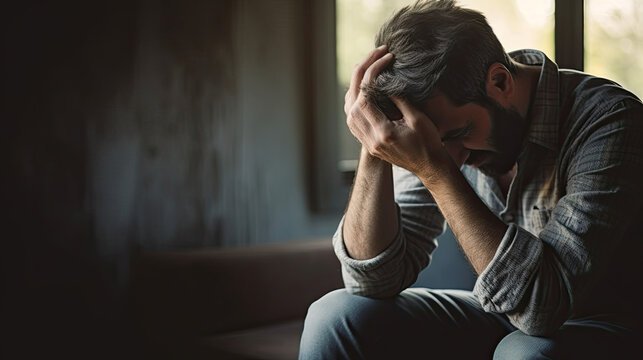Depression and anxiety are two of the most common mental health disorders. While they often occur together, they have distinct symptoms and can affect individuals differently.
Depression
Symptoms:
- Persistent Sadness: Feeling sad, empty, or hopeless most of the time.
- Loss of Interest: Losing interest in activities once enjoyed, including hobbies and socializing.
- Fatigue: Experiencing a lack of energy and feeling tired most of the time.
- Sleep Disturbances: Having trouble sleeping, waking up early, or oversleeping.
- Appetite Changes: Significant weight loss or gain due to changes in appetite.
- Concentration Issues: Difficulty concentrating, making decisions, or remembering things.
- Physical Symptoms: Experiencing unexplained aches and pains.
- Feelings of Worthlessness: Excessive guilt, feelings of worthlessness, or self-blame.
- Thinking about death:
Causes:
- Biological Factors: Imbalances in brain chemicals (neurotransmitters), genetics, and hormones.
- Psychological Factors: Negative thinking patterns, low self-esteem, and a history of trauma or abuse.
- Environmental Factors: Stressful life events, such as the loss of a loved one, financial problems, or relationship issues.
Anxiety
Symptoms:
- Excessive Worry: Persistent and excessive worry about various aspects of life, such as work, health, or social interactions.
- Restlessness: Feeling restless, on edge, or unable to relax.
- Fatigue: Feeling tired easily.
- Difficulty Concentrating: Trouble concentrating or having your mind go blank.
- Irritability: Feeling irritable or on edge.
- Muscle Tension: Experiencing muscle aches or tension.
- Sleep Problems: Difficulty falling asleep, staying asleep, or having restless, unsatisfying sleep.
Types of Anxiety Disorders:
- Generalized Anxiety Disorder (GAD): Chronic anxiety, worry, and tension without a specific cause.
- Panic Disorder: Recurrent panic attacks, which are sudden periods of intense fear.
- Specific Phobias: Extreme fear of specific objects or situations, such as heights, flying, or spiders.
- Obsessive-Compulsive Disorder (OCD): Persistent, unwanted thoughts (obsessions) and repetitive behaviors (compulsions).
- Post-Traumatic Stress Disorder (PTSD): Anxiety following a traumatic event, characterized by flashbacks, nightmares, and severe anxiety.
Causes:
- Biological Factors: Imbalances in neurotransmitters, genetics, and brain structure.
- Psychological Factors: Personality traits, such as perfectionism and low self-esteem.
- Environmental Factors: Stressful or traumatic life events, such as abuse, loss, or significant changes.
Treatment:
- Medications: Anti-anxiety medications, antidepressants, and beta-blockers.
- Psychotherapy: Cognitive-behavioral therapy (CBT), exposure therapy, and other forms of talk therapy.
- Lifestyle Changes: Regular physical activity, relaxation techniques (such as deep breathing, meditation, and yoga), and a healthy diet.
- Support Groups: Joining support groups to share experiences and coping strategies.
Co-Occurrence of Depression and Anxiety
Many individuals experience both depression and anxiety simultaneously, which can complicate diagnosis and treatment. Integrated treatment approaches that address both conditions are often most effective.
Seeking Help
If you or someone you know is experiencing symptoms of depression or anxiety, it is important to seek professional help.
DEALING WITH DEPRESSION AND ANXIETY
Dealing with depression and anxiety can be challenging, but there are various strategies and treatments that can help manage and alleviate symptoms. Here are some steps and approaches to consider:
Professional Help
- Therapy
- Dialectical Behavior Therapy (DBT): Combines CBT with mindfulness strategies.
- Medication
- Antidepressants: SSRIs (e.g., fluoxetine, sertraline), SNRIs (e.g., venlafaxine, duloxetine), tricyclic antidepressants, and MAO inhibitors.
- Anti-Anxiety Medications: Benzodiazepines (e.g., diazepam, lorazepam) for short-term relief, and longer-term options like buspirone.
- Combination Therapy: Sometimes, a combination of medications and therapy is most effective.
Self-Help Strategies
- Lifestyle Changes
- Regular Exercise: Physical activity can boost mood and reduce anxiety by releasing endorphins.
- Healthy Diet: Eating a balanced diet can affect overall mood and energy levels.
- Adequate Sleep: Ensure good sleep hygiene and aim for 7-9 hours of sleep per night.
- Social Support
- Connecting with Friends and Family: Social support is crucial for emotional well-being.
- Support Groups: Joining groups where you can share experiences and receive support from others with similar issues.
- Healthy Habits
- Limit Alcohol and Avoid Drugs: Substance use can exacerbate depression and anxiety.
- Reduce Caffeine Intake: Caffeine can increase anxiety and disrupt sleep.
- Engage in Hobbies and Activities: Find activities that bring joy and fulfillment.
Cognitive and Behavioral Techniques
- Journaling
- Gratitude Journal: Write down things you are grateful for each day.
- Thought Journal: Record negative thoughts and challenge them with evidence-based responses.
- Goal Setting
- Set Realistic Goals: Break larger goals into smaller, achievable steps.
- Track Progress: Celebrate small victories to build momentum.
- Cognitive Restructuring
- Identify Negative Thoughts: Recognize automatic negative thoughts.
- Challenge and Replace: Replace them with more balanced, realistic thoughts.
Building Resilience
- Develop Problem-Solving Skills
- Identify Problems: Clearly define what is causing stress or anxiety.
- Create Action Plans: Develop step-by-step plans to address issues.
- Enhance Self-Esteem
- Self-Compassion: Practice self-kindness and recognize your own worth.
- Positive Affirmations: Use affirmations to build confidence and positivity.
- Learn to Accept Uncertainty
- Embrace Change: Understand that change is a part of life and learn to adapt.
- Focus on Control: Concentrate on what you can control and let go of what you cannot.
When to Seek Immediate Help
- Suicidal Thoughts: If you or someone you know is experiencing suicidal thoughts, seek immediate help from a mental health professional or call emergency services.
- Severe Anxiety Attacks: If anxiety becomes unmanageable or leads to panic attacks, professional intervention is necessary.
Managing depression and anxiety often requires a combination of approaches tailored to the individual’s needs. Regular consultation with healthcare providers can help monitor progress and make necessary adjustments to the treatment plan.




